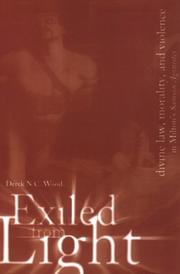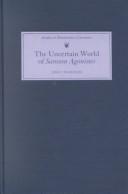| Listing 1 - 6 of 6 |
Sort by
|
Book
ISBN: 069106671X 1306989922 1400854172 0691611092 9781400854172 9780691611099 9780691066714 Year: 2014 Publisher: Princeton, NJ
Abstract | Keywords | Export | Availability | Bookmark
 Loading...
Loading...Choose an application
- Reference Manager
- EndNote
- RefWorks (Direct export to RefWorks)
Joseph Wittreich reveals Samson to be an intensely political work that reflects the heroic ambitions and failings of the Puritan Revolution and the tragic ambiguities of the era. He sees in the work not the purveyance of Medieval and early Renaissance typological associations but an interrogation of them and a consequent movement away from them.Originally published in 1986.The Princeton Legacy Library uses the latest print-on-demand technology to again make available previously out-of-print books from the distinguished backlist of Princeton University Press. These editions preserve the original texts of these important books while presenting them in durable paperback and hardcover editions. The goal of the Princeton Legacy Library is to vastly increase access to the rich scholarly heritage found in the thousands of books published by Princeton University Press since its founding in 1905.
Milton, John, -- 1608-1674. -- Samson Agonistes. --- Samson -- (Biblical judge) -- In literature. --- Samson --- Shimshon --- Shimshoni, --- Shimshūn --- Simson --- שמשוני --- שמשון --- Milton, John, --- Samson, --- In literature. --- Milton (John). Samson Agonistes. --- DRAMA / English, Irish, Scottish, Welsh.

ISBN: 1282033816 9786612033810 1442674717 9781442674714 9781282033818 080204848X 9780802048486 6612033819 Year: 2001 Publisher: Toronto
Abstract | Keywords | Export | Availability | Bookmark
 Loading...
Loading...Choose an application
- Reference Manager
- EndNote
- RefWorks (Direct export to RefWorks)
Despite considerable general disagreement about the meaning of Milton's Samson Agonistes, literary critics have largely come to view, Samson, as a saintly Christian hero, with attending themes of election, conversion and regeneration. In a challenge to this dominant interpretation, Derek Wood proposes that Milton's protagonist is actually an emblematic embodiment of Old Testament consciousness as a rigorous, incomplete, literalistic and uncomprehending, fashioned by the old Mosaic Law, without the amelioration of Christ's charity and forgiveness. Wood begins by surveying and evaluating the critical literature on Samson Agonistes of the past fifty years, then challenges these readings through a comprehensive textual and formal analysis. He argues for a thorough understanding of Artistotle's theory of tragedy, in which Milton's practice was anchored and draws cogently on early modern European commentaries as well as contemporary re-evaluations of Aristotle's Poetics to clarify Milton's approach. Wood's contribution reconciles the orthodox interpretation of Samson as a Christian saint with the revisionist emphasis on his murderous brutality. The author's analysis corrects a number of errors made by previous Milton scholars, shows how Dalila has been consistently misread and decodes the politics of the tragedy in the context of Milton's final years as an aging, failed revolutionary.
LITERARY CRITICISM / European / English, Irish, Scottish, Welsh. --- Milton, John, --- Samson --- Samson, --- Shimshon --- Shimshoni, --- Shimshūn --- Simson --- שמשוני --- שמשון --- In literature. --- Violence in literature. --- Ethics in literature. --- Bible and law. --- Law and the Bible --- Law --- Samson Agonistes (Milton, John) --- Milton's Samson Agonistes (Milton, John)
Book
ISBN: 0231038429 9780231038423 Year: 1974 Publisher: New York (N.Y.): Columbia university press
Abstract | Keywords | Export | Availability | Bookmark
 Loading...
Loading...Choose an application
- Reference Manager
- EndNote
- RefWorks (Direct export to RefWorks)
Milton, John, --- Samson --- In literature --- Milton, John --- Samson (Biblical judge) --- -In literature --- In literature. --- Samson, --- Shimshon --- Shimshoni, --- Shimshūn --- Simson --- שמשוני --- שמשון --- Milton, John, - 1608-1674 - Samson Agonistes --- Samson - (Biblical judge) - In literature --- Samson - (Biblical judge)

ISBN: 1846153417 085991609X Year: 2001 Publisher: Cambridge ; Rochester, NY : D.S. Brewer,
Abstract | Keywords | Export | Availability | Bookmark
 Loading...
Loading...Choose an application
- Reference Manager
- EndNote
- RefWorks (Direct export to RefWorks)
Shawcross proposes that the many ambiguities surrounding Milton's dramatic poem Samson Agonistes are intentional: the actual words, the dates of composition, the genre, and the characters - particularly Samson and Dalila but including Manoa, Harapha, and the Chorus. Ambiguity also lies in Milton's presentation of political issues both philosophical and practical, his treatment of gender concepts, the constant questioning of the reader, and the poem's effect. Discussing all these elements, Shawcross follows with a detailed reading of the text which argues that it remains purposefully ambiguous, reflecting Milton's own recognition of the uncertainty of the content, and suggesting that Milton himself would question some of the nice 'solutions' that modern scholarship has offered in the last two decades. JOHN SHAWCROSS is Professor of English, Emeritus, University of Kentucky.
Belief and doubt in literature. --- Samson --- Milton, John, --- In literature. --- Samson, --- Shimshon --- Shimshoni, --- Shimshūn --- Simson --- שמשוני --- שמשון --- Enlightenment irreligion. --- Milton. --- Samson Agonistes. --- ambiguity. --- authorial intentions. --- dramatic poem. --- gender concepts. --- political issues. --- science. --- society. --- LITERARY CRITICISM / American / General.
Book
ISBN: 0228015863 0228015855 Year: 2022 Publisher: Montreal, Quebec : McGill-Queen's University Press,
Abstract | Keywords | Export | Availability | Bookmark
 Loading...
Loading...Choose an application
- Reference Manager
- EndNote
- RefWorks (Direct export to RefWorks)
It was neither the civilization of Renaissance Italy nor the printing press that created the modern world. Instead, it was reading. Through historical analysis and readings of Petrarch, Bruni, Valla, Reuchlin, Erasmus, Foxe and Milton, The Communion of the Book explores how literacy produced modern values, and how digital media threaten those values.
Books and reading --- Civilization, Modern. --- Humanism --- Literacy --- Reading. --- History. --- History. --- History. --- Adrian Johns. --- Aeneid. --- Benedict Anderson. --- Book of Martyrs. --- Elizabeth Eisenstein. --- English Levellers. --- English Revolution. --- Erasmus. --- Euripides. --- Greek tragedy. --- Harold Innis. --- John Foxe. --- John Lilburne. --- Joseph Henrich. --- Leonardo Bruni. --- Lorenzo Valla. --- Marshall McLuhan. --- Paradise Regained. --- Petrarch. --- Renaissance. --- Roman history. --- Samson Agonistes. --- Stanislas Deheane. --- Stationers Company. --- book history. --- classics. --- common law. --- continental jurisprudence. --- continuous reading. --- democracy. --- digital cognition. --- humanist historiography. --- humanist printers. --- incunabula. --- indexical reading. --- literacy rates. --- logos. --- media change. --- metaphor. --- metonymy. --- modernity. --- monopolies of knowledge. --- papyrus codex. --- papyrus scroll. --- parchment codex. --- philoglogy. --- print nations. --- reader neurology. --- reading history. --- sacramental theology. --- science printing. --- sermo.
Book
ISBN: 1400874920 9781400874927 0691060517 0691624658 Year: 2015 Publisher: Princeton, NJ
Abstract | Keywords | Export | Availability | Bookmark
 Loading...
Loading...Choose an application
- Reference Manager
- EndNote
- RefWorks (Direct export to RefWorks)
Although Renaissance scholars generally agree that Della Porta was the finest comic playwright of his generation in Italy, no detailed analysis of these plays and of their considerable influence outside Italy has previously appeared. One of the most famous men of his time in the field of scientific investigation, Della Porta wrote plays for relaxation and, on occasion, to camouflage controversial aspects of his scientific research from the Inquisitions. Today his works in science are largely forgotten and his right to fame rests on the plays. This book brings together the available facts of Della Porta's rich and often mysterious life and closely examines his dramatic works as part of the Italian literary scene in late Renaissance. Originally published in 1965.The Princeton Legacy Library uses the latest print-on-demand technology to again make available previously out-of-print books from the distinguished backlist of Princeton University Press. These editions preserve the original texts of these important books while presenting them in durable paperback and hardcover editions. The goal of the Princeton Legacy Library is to vastly increase access to the rich scholarly heritage found in the thousands of books published by Princeton University Press since its founding in 1905.
LITERARY CRITICISM / Drama. --- Porta, Giambattista della, --- Della Porta, Giambattista, --- Porta, Iean Baptiste, --- Porta, J. B. --- Porta, Jean-Batiste, --- Porta, Ioannes Baptista, --- Porta, Joannes Baptista, --- Porta, Iogann Baptist della, --- Porta, Giovanni Battista della, --- Porta, Gio. Battista dalla --- Porta, Io. Baptista --- Porta, Giovanbattista della, --- Porta, Johann Baptista, --- Porta, Giovambattista dalla, --- Porta, John Baptista, --- Porta, G. B. della --- Porta, Giovan Battista della, --- Della Porta, Giovan Battista, --- Dramatists, Italian --- Accademia dei Lincei. --- Albumazar. --- Alessandro Piccolomini. --- Ars Poetica (Horace). --- Asinaria. --- Astolfo. --- Astrology. --- Aulularia. --- Bacchides (play). --- Bartolomeo. --- Benedetto Croce. --- Benedetto. --- Caetani. --- Caricature. --- Carlo Goldoni. --- Classicism. --- Commedia dell'arte. --- Counter-Reformation. --- Divine Comedy. --- Drama. --- Duke of Florence. --- Farce. --- Federico Cesi. --- Francesco Andreini. --- Francesco D'Isa. --- Francis Bacon (artist). --- François Rabelais. --- G. (novel). --- Genre. --- Giambattista Basile. --- Giambattista Marino. --- Giambattista della Porta. --- Giordano Bruno. --- Giovanni Battista. --- Giovanni Francesco Sagredo. --- Girolamo. --- Hyperbole. --- Ibid (short story). --- Ignoramus. --- Il pastor fido. --- In Town (musical). --- Innamorati. --- James Shirley. --- La Spagna. --- La Strada. --- Lazzi. --- Lingua (play). --- Literature. --- Lorenzino de' Medici. --- Luigi Groto. --- Luigi d'Este. --- Massimo. --- Melodrama. --- Melodramma. --- Menaechmi. --- Miles Gloriosus (play). --- Necromancy. --- Neoclassicism. --- Nicolas-Claude Fabri de Peiresc. --- Novella. --- Orazio. --- Orbecche. --- Orlando Furioso. --- Ottava rima. --- Parody. --- Pedant. --- Physiognomy. --- Plautus. --- Playwright. --- Poenulus. --- Pompeo. --- Pomponio Torelli. --- Potboiler. --- Prose. --- Pulcinella. --- Pun. --- Renaissance. --- Romanticism. --- Rudens (play). --- Ruggiero (character). --- S. (Dorst novel). --- Samson Agonistes. --- Sarabande. --- Satire. --- Scipione. --- Sententiae. --- Soliloquy. --- Sophocles. --- Subplot. --- Tartaglia (commedia dell'arte). --- Terence. --- The Parliament of Love. --- The Valet. --- Titinius. --- Tolomeo. --- Torelli. --- Torquato Tasso. --- Tragicomedy. --- Ulisse. --- Zanni.
| Listing 1 - 6 of 6 |
Sort by
|

 Search
Search Feedback
Feedback About UniCat
About UniCat  Help
Help News
News